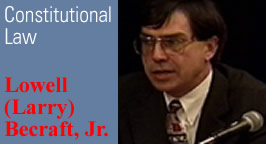Other
Becraft
Articles:
Jurisdiction Questioned,
Part 1
THE INHERENT PRESIDENTIAL POWER TO SEIZE
By
Attorney Lowell (Larry) Becraft, Jr.
August 3, 2007
NewsWithViews.com
In times of war or international conflict, Congress has closely regulated trade with other countries, and particularly that concerning implements of war and financial transactions. See, for example, the Trading With the Enemy Act (�TWE�), 40 Stat. 411, ch. 106. Based on this 1917 act, during WWI and WWII, funds and property consisting of real estate, businesses, ships, copyrights, and other forms of property associated in some fashion with �the enemy� and its allies were seized by a federal official named the Alien Property Custodian. Some of these properties were forfeited to the United States and others were delivered to the true owners after cessation of hostilities. Clearly, seizure during war of enemy property that is located in this country plays an important role in the conduct of the war. The President�s role in this process of seizing enemy assets has been set forth in laws enacted by Congress such as the TWE.
In late 1951, the United Steelworkers of America were contemplating a strike for higher wages against this country�s steel companies, then engaged in the manufacture of war materiels essential for prosecution of the Korean War. Shortly before that union�s proposed strike in April, 1952, President Truman issued Executive Order ("EO") 10340 directing the Secretary of Commerce to seize and operate most steel mills. However, the President had no statutory authority for this seizure. These companies instituted suit and obtained an injunction against the seizures. In June, 1952, the Supreme Court rendered its decision in Youngstown Sheet & Tube Co. v. Sawyer, 343 U.S. 579 (1952), and clearly held that the President could not so seize absent statutory authorization from Congress. Thus the President, even during times of war, may seize property only as authorized by law.
Presently, the President possesses pursuant to the International Emergency Economic Powers Act ("IEEPA"), 50 U.S.C. �1701 et seq., a power to seize during declared international emergencies. The circumstances under which the President may so seize are set forth in 50 U.S.C. �1701, which provides:
�Section 1701. Unusual and extraordinary threat; declaration of national emergency; exercise of Presidential authorities. �(a) Any authority granted to the President by section 1702 of this title may be exercised to deal with any unusual and extraordinary threat, which has its source in whole or substantial part outside the United States, to the national security, foreign policy, or economy of the United States, if the President declares a national emergency with respect to such threat.
�(b) The authorities granted to the President by section 1702 of this title may only be exercised to deal with an unusual and extraordinary threat with respect to which a national emergency has been declared for purposes of this chapter and may not be exercised for any other purpose. Any exercise of such authorities to deal with any new threat shall be based on a new declaration of national emergency which must be with respect to such threat.�
The powers granted to him via the IEEPA permit the President to do so only when the emergency �has its source in whole or substantial part outside the United States.� The powers the President can exercise pursuant to this act are set forth in �1702, which provides as follows:
�Section
1702. Presidential authorities.
�(a) In general.
�(1) At the times and to the extent specified in section 1701 of this
title, the President may, under such regulations as he may prescribe,
by means of instructions, licenses, or otherwise -
�(A)
investigate, regulate, or prohibit -
�(i) any transactions in foreign exchange,
�(ii) transfers of credit or payments between, by, through, or to
any banking institution, to the extent that such transfers or payments
involve any interest of any foreign country or a national thereof,
�(iii) the importing or exporting of currency or securities, by any
person, or with respect to any property, subject to the jurisdiction
of the United States;
�(B) investigate, block during the pendency of an investigation, regulate, direct and compel, nullify, void, prevent or prohibit, any acquisition, holding, withholding, use, transfer, withdrawal, transportation, importation or exportation of, or dealing in, or exercising any right, power, or privilege with respect to, or transactions involving, any property in which any foreign country or a national thereof has any interest by any person, or with respect to any property, subject to the jurisdiction of the United States; and
�(C) when the United States is engaged in armed hostilities or has been attacked by a foreign country or foreign nationals, confiscate any property, subject to the jurisdiction of the United States, of any foreign person, foreign organization, or foreign country that he determines has planned, authorized, aided, or engaged in such hostilities or attacks against the United States; and all right, title, and interest in any property so confiscated shall vest, when, as, and upon the terms directed by the President, in such agency or person as the President may designate from time to time, and upon such terms and conditions as the President may prescribe, such interest or property shall be held, used, administered, liquidated, sold, or otherwise dealt with in the interest of and for the benefit of the United States, and such designated agency or person may perform any and all acts incident to the accomplishment or furtherance of these purposes.�
The essential conditions which must exist in order for the President to implement the IEEPA are the following: when the emergency that the President declares �has its source in whole or substantial part outside the United States,� he may seize property in which a foreign country or national thereof (�foreign person, foreign organization�) has an interest that is located in this country.
When this country invaded Iraq and deposed Saddam, President Bush used the statutory authority granted to him via the IEEPA. EO 13303, issued on May 22, 2003, was designed to protect the Development Fund for Iraq. Later on August 28, 2003, President Bush issued EO 13315 that seized whatever property was owned by the various individuals named in EO 13315, (including Saddam, Tariq Aziz, etc) that was then in the possession of United States persons. Thus, if Syria claimed an interest in certain oil shipments or funds located in this country, but evidence clearly indicated that Syria was merely acting for principals in Iraq who really owned such property, that property could be seized if located here, regardless of whether Texaco or Bank of America held such property or funds for those "persons" (individuals or aliens).
On July 17, 2007, President Bush issued EO 13438. This EO concerns �persons� who �have committed, or [ ] pose a significant risk of committing, an act or acts of violence that have the purpose or effect of: [ ] threatening the peace or stability of Iraq or the Government of Iraq; [ ] or undermining efforts to promote economic reconstruction and political reform in Iraq or to provide humanitarian assistance to the Iraqi people.� This EO must be read and construed in light of the statutory authority of the President in this respect.
The exercise of Presidential authority granted via the IEEPA is valid only for threats having a source in whole or substantial part outside the United States and involve a foreign country or national thereof. Thus, EO 13438 poses no threat to any American citizen who does not possess property of an "enemy alien." Furthermore, an American citizen merely demonstrating against the war in Iraq is not a party against whom the sanctions of EO 13438 may be imposed. His property, in which no foreign country or national has an interest, cannot be seized thereby.
|
Subscribe to the NewsWithViews Daily News Alerts! |
Many misconstrue legal documents such as EOs without undertaking an analysis of their context. When doing so, there is an inherent tendency to concede greater power to the federal government than is even being exercised. Doing this is hazardous and should be avoided.
� 2007 Lowell Becraft - All Rights
Reserved
Lowell (Larry) Becraft, Jr., is a constitutional attorney based in Huntsville, Alabama, who specializes in criminal defense cases, primarily involving the federal income tax. His legal web site is: http://home.hiwaay.net/~becraft/
E-Mail: becraft@hiwaay.net
On
July 17, 2007, President Bush issued EO 13438. This EO concerns �persons�
who �have committed, or [ ] pose a significant risk of committing, an
act or acts of violence that have the purpose or effect of: [ ] threatening
the peace or stability of Iraq or the Government of Iraq...











